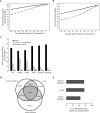Evolutionary constraint facilitates interpretation of genetic variation in resequenced human genomes
- PMID: 20067941
- PMCID: PMC2840986
- DOI: 10.1101/gr.102210.109
Evolutionary constraint facilitates interpretation of genetic variation in resequenced human genomes
Abstract
Here, we demonstrate how comparative sequence analysis facilitates genome-wide base-pair-level interpretation of individual genetic variation and address two questions of importance for human personal genomics: first, whether an individual's functional variation comes mostly from noncoding or coding polymorphisms; and, second, whether population-specific or globally-present polymorphisms contribute more to functional variation in any given individual. Neither has been definitively answered by analyses of existing variation data because of a focus on coding polymorphisms, ascertainment biases in favor of common variation, and a lack of base-pair-level resolution for identifying functional variants. We resequenced 575 amplicons within 432 individuals at genomic sites enriched for evolutionary constraint and also analyzed variation within three published human genomes. We find that single-site measures of evolutionary constraint derived from mammalian multiple sequence alignments are strongly predictive of reductions in modern-day genetic diversity across a range of annotation categories and across the allele frequency spectrum from rare (<1%) to high frequency (>10% minor allele frequency). Furthermore, we show that putatively functional variation in an individual genome is dominated by polymorphisms that do not change protein sequence and that originate from our shared ancestral population and commonly segregate in human populations. These observations show that common, noncoding alleles contribute substantially to human phenotypes and that constraint-based analyses will be of value to identify phenotypically relevant variants in individual genomes.
Figures




Similar articles
-
Analysis of sequence conservation at nucleotide resolution.PLoS Comput Biol. 2007 Dec;3(12):e254. doi: 10.1371/journal.pcbi.0030254. Epub 2007 Nov 14. PLoS Comput Biol. 2007. PMID: 18166073 Free PMC article.
-
Selective constraint, background selection, and mutation accumulation variability within and between human populations.BMC Genomics. 2013 Jul 23;14:495. doi: 10.1186/1471-2164-14-495. BMC Genomics. 2013. PMID: 23875710 Free PMC article.
-
Natural Selection and Functional Potentials of Human Noncoding Elements Revealed by Analysis of Next Generation Sequencing Data.PLoS One. 2015 Jun 8;10(6):e0129023. doi: 10.1371/journal.pone.0129023. eCollection 2015. PLoS One. 2015. PMID: 26053627 Free PMC article.
-
The promise of comparative genomics in mammals.Science. 1999 Oct 15;286(5439):458-62, 479-81. doi: 10.1126/science.286.5439.458. Science. 1999. PMID: 10521336 Review.
-
Cis-acting regulatory variation in the human genome.Science. 2004 Oct 22;306(5696):647-50. doi: 10.1126/science.1101659. Science. 2004. PMID: 15499010 Review.
Cited by
-
Predicting functionally important SNP classes based on negative selection.BMC Bioinformatics. 2011 Jan 19;12:26. doi: 10.1186/1471-2105-12-26. BMC Bioinformatics. 2011. PMID: 21247465 Free PMC article.
-
Molecular Genetic Diagnosis with Targeted Next Generation Sequencing in a Cohort of Turkish Osteogenesis Imperfecta Patients and their Genotype-phenotype Correlation.J Clin Res Pediatr Endocrinol. 2024 Dec 4;16(4):431-442. doi: 10.4274/jcrpe.galenos.2024.2022-12-8. Epub 2024 Jun 3. J Clin Res Pediatr Endocrinol. 2024. PMID: 38828893 Free PMC article.
-
Estimating the mutation load in human genomes.Nat Rev Genet. 2015 Jun;16(6):333-43. doi: 10.1038/nrg3931. Epub 2015 May 12. Nat Rev Genet. 2015. PMID: 25963372 Free PMC article. Review.
-
Comparative population genomics: power and principles for the inference of functionality.Trends Genet. 2014 Apr;30(4):133-9. doi: 10.1016/j.tig.2014.02.002. Epub 2014 Mar 20. Trends Genet. 2014. PMID: 24656563 Free PMC article. Review.
-
A genome-wide comparison of the functional properties of rare and common genetic variants in humans.Am J Hum Genet. 2011 Apr 8;88(4):458-68. doi: 10.1016/j.ajhg.2011.03.008. Epub 2011 Mar 31. Am J Hum Genet. 2011. PMID: 21457907 Free PMC article.
References
Publication types
MeSH terms
LinkOut - more resources
Full Text Sources
Other Literature Sources
